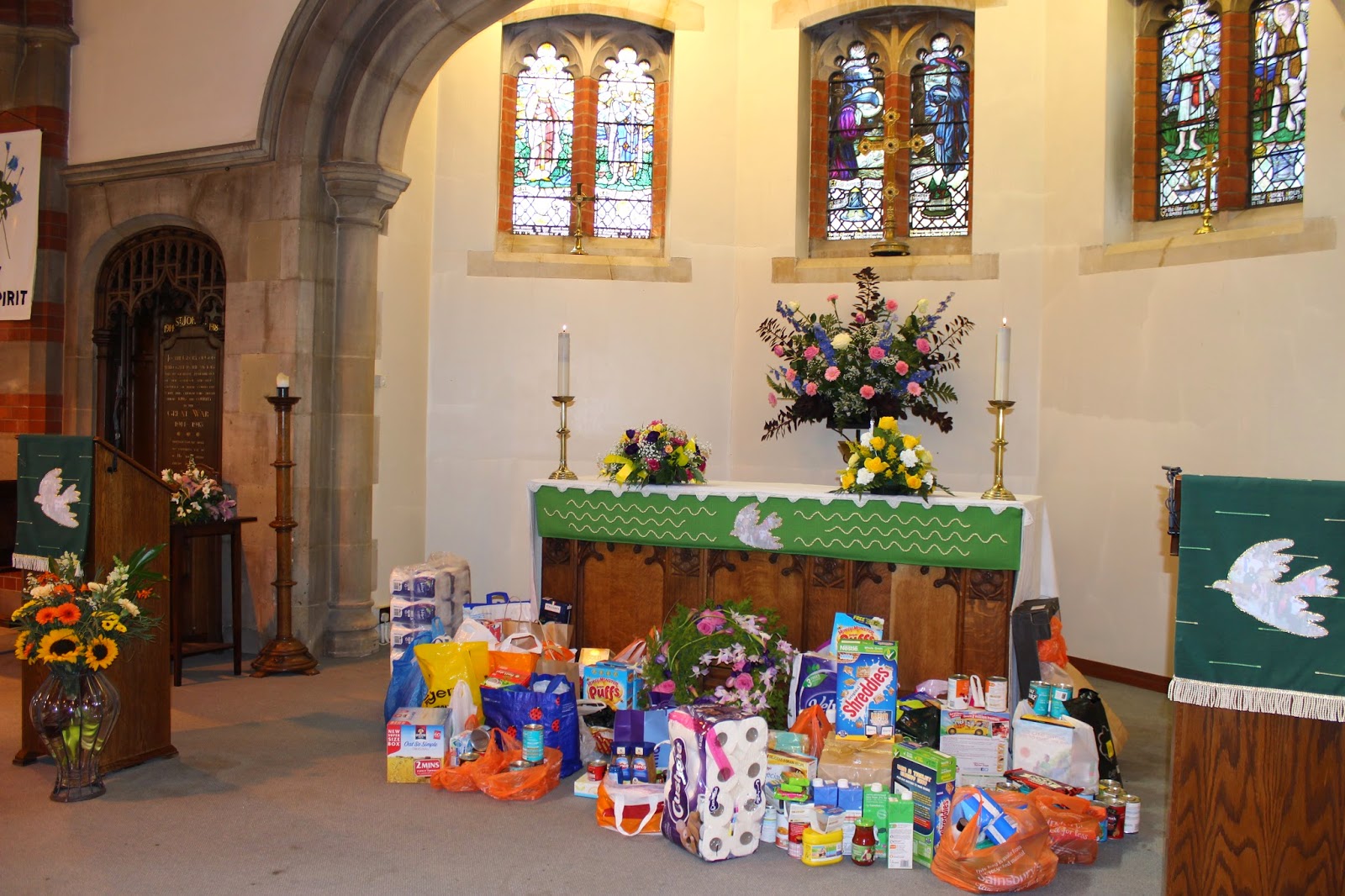Sunday, 21 September 2014
Harvest Festival
The Harvest Festival at St John's Seven Kings had the theme of 'reduce, recycle and reuse' and included our children and young people performing a poem and song as well as making a green heart sculpture using junk items. Our music group led the singing of contemporary and traditional Harvest songs in a service that also featured The Lord's Prayer being read in old English. We collected Harvest goods for the Redbridge foodbank and were thrilled with the genorosity of those who came. We explored our theme with projected information on green initiatives as well as thinking through Bible passages about reducing the yield from the harvest in order to leave grain for others (Leviticus 23. 22), recycling by remaking failed pots (Jeremiah 18. 1 - 6), and minimising waste by reusing leftover food (John 6. 12).
Reduce, re-use and re-cycle isn’t a message that is very obviously found in the Bible – certainly not as a punchy slogan! However, we’ve found three examples to share with you briefly today of those three things as found in different parts of the Bible.
Leviticus 23 v 22
We don’t often read Leviticus, as it is a book filled with rules and regulations for the People of Israel rather than stories about them. However, this passage is actually well known to because of a story found in another book of the Bible; the book of Ruth. When Ruth and Naomi return to Israel they are very poor and a local farmer, Boaz, takes pity on Ruth and allows her to do what is described in this passage; to leave the grain at the edges of the fields so that poor people like Ruth can harvest it and make food to survive. Boaz could harvest the whole of his fields and keep all the grain for himself but doesn’t. Instead he deliberately reduces what he harvests for himself in order to ensure that there is something left over for those less well off than himself. In doing so, he is following a specific instruction from God, which is not directly applicable to us today because we are not farmers harvesting fields, but can still apply if we reduce what we have for ourselves in order that we share something of what we have with others less well off than ourselves.
Jeremiah 18. 1 – 6
This is a well known passage to do with God shaping and moulding our lives. It is a passage that we often sing in church through songs like ‘Spirit of the Living God’ and ‘Jesus, you are changing me’. In the passage, God as the potter recycles the clay. When it does turn out well on the wheel, he doesn’t simply throw away the clay with which the mistake was made. Instead he reworks and recycles it turns it into something new. The green heart which our children have made today is intended to symbolise the same thing. Often things which we ordinarily throw away can be recycled, whether through the Council’s recycling service or because we turn junk into something useful. Monica Abdala, who some of you will know as heading up Redbridge Street Pastors, is currently setting up a social enterprise to make new products from old pieces of material in order to raise funds to help street girls leave the streets. By doing that, she is putting into practice what this passage teaches.
John 6. 12
One of the interesting points about the feeding of the 5,000 which we often overlook is that the disciples cleared up after the people and kept, presumably to reuse, all the leftover food – 12 baskets full. We live in a culture which is incredibly wasteful. Last year a report called ‘Waste Not, Want Not’ estimated that as much as half of all the food produced in the world – equivalent to 2bn tonnes – ends up as waste every year. Tim Fox, head of energy and environment at the Institution of Mechanical Engineers who produced the report, said: "The amount of food wasted and lost around the world is staggering. This is food that could be used to feed the world's growing population – as well as those in hunger today. It is also an unnecessary waste of the land, water and energy resources that were used in the production, processing and distribution of this food." What has to change, they said, are people's mindsets on waste in order to discourage wasteful practices by farmers, food producers, supermarkets and consumers. In this passage, we see Jesus and his disciples modelling that kind of change.
Reduce, re-use and re-cycle isn’t a slogan that is found in the Bible but it is a message that these passages from the Bible endorse and commend.
--------------------------------------------------------------------------------------
We Plough The Fields And Scatter.
Subscribe to:
Post Comments (Atom)



No comments:
Post a Comment